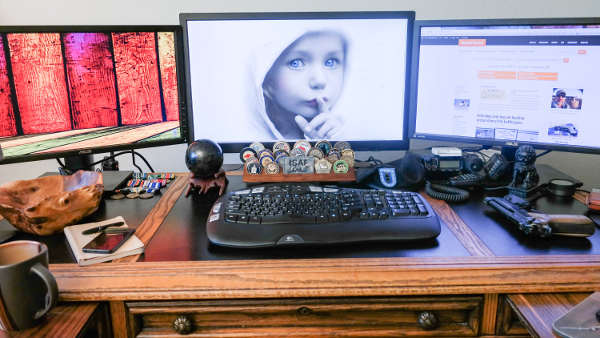 So we learned the other day about balancing OPSEC so you could still operate. Today we’ll go over classifying your information. This is a topic that I’m EXTREMELY familiar with.
So we learned the other day about balancing OPSEC so you could still operate. Today we’ll go over classifying your information. This is a topic that I’m EXTREMELY familiar with.
This is a little bit advanced information, and not everyone follows it but if you’re truly concerned about protecting your family and your group if SHTF, then you need to at least understand it.
The government classifies their information like this:
- Top Secret
- Top secret means that if the enemy found out about it, it would cause “exceptionally grave damage” to national security.
- Secret
- Secret means it would cause “serious damage” to national security. Most information that’s classified is at this level.
- Confidential
- Confidential means that if the information got out, it would cause damage.
- SCI
- SCI stands for Sensitive Compartmented Information. This is just another step to ensure that only people who have need-to-know can actually know it.
Just FYI, the government automatically gives someone a clearance if they don’t find anything negative in their investigation. You shouldn’t probably do the same thing. What you should do, however, is check into the background of anyone outside your family who’s interested in joining the group that would have access to information that could hurt you.
So why not just classify everything TS? The problem is that controlling and protecting information costs money, space, and effort. In the government world, even discussing TS information is supposed to be done in what’s called a SCIF, for Sensitive Compartmented Information Facility. A SCIF is just a place that’s been checked out for bugs (supposedly) and has certain protocols to make sure people can’t hear or see the information inside (which I won’t be getting into here today – sorry). You can’t really operate very well if you have to build a SCIF into every building and go in it every time you want to look at or use information. Also, you can’t just let everyone know everything. There has to be a balance. In a perfect world, things would only be classified to the minimum level that works. In the real world, people classify things WAY TOO MUCH, making it difficult to operate.
Need to know
You’ve probably heard this term on TV and in the movies but what exactly does it mean? Just because you trust someone doesn’t mean that they should know everything. I may have a friend that I’d trust with my life but there’s no reason to give him the combination to my garage unless it came time for him to use it. It’s not that I don’t trust him, it’s because the more information that you have out there, the harder it is to control. What if he accidentally wrote it down somewhere for someone to read that I don’t trust? The less people who know details about your life and your operations, the better.
So what does classified information have to do with preppers?
Just like the government, you have classified information. The code to your alarm system, the logins and passwords to your bank accounts, the weapons and ammunition you have, even your home address should have some sort of classification to it, and it should be treated as such.
CONFIDENTIAL
Let’s look at your home address. It’s public knowledge, right? Yes, but you wouldn’t want everyone to know it. It’s at the CONFIDENTIAL level. If you have a garage remote in your car, make sure you don’t have any information about your address or they could steal the remote, head to your home, and get inside. Don’t think that keeping your inner door to the garage will do anything – they’ll just close the garage door and smash in the inner door. Remove all letters, warranties, registrations, or anything else that’s in your car that has your address. Also, your address shouldn’t be put on Facebook or any other social media.
By getting clues from your comments, someone could find out what you have at home, who lives there, and even when you’ll be gone. Your address shouldn’t be given out into the public domain unless it’s necessary. In fact, you should take steps to remove your personal information from internet databases as well. Almost everything dealing with your children should also be confidential. Where they go to school, who they go hang out with, all of it. So, for you, anything that just some anonymous joe schmoe shouldn’t have access to should be considered confidential and not put out into public. It’s not to the level of SECRET though.
If you want to be very thorough, I recommend reading How to Disappear: Erase Your Digital Footprint, Leave False Trails, and Vanish without a Trace. I work as a private investigator sometimes for Teentrak to find missing and runaway kids. You’d be surprised how easy it is to piece together information on the internet about someone.
Did you know that some photographs have something called EXIF information that can tell you where the picture was taken? If you have photos that you share with others, give them a run with Jeffrey’s EXIF Viewer. You may be surprised at just what someone could learn. Luckily, facebook strips that information now. It used to be pretty bad.
SECRET
SECRET information is something that could really do some damage. An example for you would be your travel dates for your next vacation and who’s watching the house. If someone knew this, they obviously could take advantage of it. Even things that could give away the fact that you’re on vacation (which are called indicators) should be guarded. Make sure someone picks up your mail and those stupid ads they throw in your yard tied to rocks from the house and have a neighbor park their car in your driveway. Because you need others to help while you’re gone, and some people might really need to know that you’ll be out (such as your boss), this can’t be TS. Besides, you can’t really protect everything that would give it away.
Certain people should be allowed to have this information. You can think of them as having SECRET access. Your family, your trusted neighbor, your best friend – basically your inner circle, should have access to most of your SECRET information. It just makes things easier to live with. For SECRET information, you shouldn’t leave it written anywhere if you can help it. If you have to, write it so that it can’t be attributed to what it goes with or change it a bit.
If you really have to write something down, in addition to writing it in some kind of code, use something like UV blacklight pens. If they don’t know the information is there, they won’t try to read it.
An example might be the login information to your facebook account. If you write it down or email it to yourself, instead of writing GuinnesS1982 or whatever crazy thing your password is, write something like BeeRgraduation. It’s enough to trigger your memory but not enough to give it away. You shouldn’t do that with TS information though.
You obviously know that your bank information needs to be protected but did you know that people can read your cards if you don’t have them shielded with something like an Identity Stronghold RFID Blocking credit card sleeve? The army gives us a sleeve just like these to protect our CAC cards for this reason. You should be taking steps to protect that information too. At least wrap your cards in aluminum foil until you get a way to protect them.
TOP SECRET
This is the stuff that you don’t let anyone know unless absolutely necessary. As mentioned, your bank access information could be considered TS. This information shouldn’t be left out anywhere. You shouldn’t write it down on a notepad for reference and keep it under your keyboard. Also, things like the combination to your gun safe should be TS. Depending on how you see the threat of someone taking your guns, the fact that you even have guns, let alones which ones you have and where you keep them, could be considered either SECRET or TOP SECRET.
TS information shouldn’t be written down anywhere unless it’s kept in something encrypted such as an encrypted thumb drive. In fact, having something like this is really helpful because it’s one place that you can keep track of all of your important information and that information won’t be accessible by anyone except you. So, for someone to have access to your TS info, you really have to trust them, and they really need to know. Just make sure you have a good system on your computer to find viruses or other nasty things that someone might put in it or on your drive to access your information.
If you have printed information or digital that isn’t encrypted, you should put it in a safe. The government only uses GSA approved safes for their classified info (well, most of the time). You probably don’t have to go to that expense but make sure you don’t put critical information in something that can be easily opened.
SCI
SCI probably isn’t something that you’d use as just a family, but if SHTF, you may be working with other preppers to protect each other and to survive. These people are going to be given access to information about your life that you aren’t going to give others. They may not be part of your inner circle, but they’re pretty close to it. Things like where your caches are kept, your guard schedule, the training and experience of each of your security personnel, the type and amount of all your medical supplies, and so on could be SCI. If you were in charge of all security for your group, you’d have need to know the security information more than most people.
You might protect your cache locations like it was SECRET but just because someone has the level of trust of SECRET doesn’t mean that they should know where they all are. Also, there’s no reason for the head of security to know what medicines you have or don’t have in a lot of cases. In most cases for the government, SCI is at the TS level but I’ve seen it at the SECRET level as well for some reason.
Protecting the information
This is a key thing to know: any information that protects classified information is classified at least as high as what it’s protecting. For example, if you have your encrypted thumb drive (did I mention you should have one of these?) and it has TS information on it, then you can’t write the password to the thumb drive down like it was only CONFIDENTIAL. That password automatically becomes TS.
What you need to do is take stock of what information you need to protect and then figure out how well you need to protect it and who should have access to it. Go through your house, your computer, your car, your social media profiles etc and start scrubbing that information. Then make sure that from now on, you only put information out to whom really needs it and record it only where it can be protected.
If you have to record something in a spreadsheet or write it down and lock it up, do like the government does and write the classification on it so you don’t accidentally share the information or give it to someone who doesn’t understand how important it is to protect it.

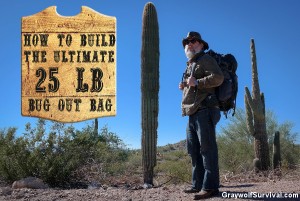
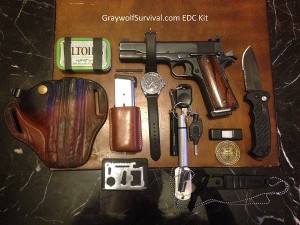
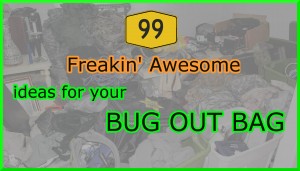
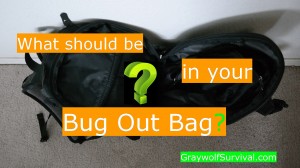


Why are you not keeping all this classified? 😉
lol
Read this – http://graywolfsurvival.com/3318/basic-opsec-training-examples-achieving-balance/
Absolutely true. I do, however, have the luxury of being well-trained and not really a target of people across the U.S. who would read my blog. I could survive if I were stuck with only what I could grab in 5 seconds as I left my home.
I’m not really concerned that someone from Georgia would drive across the U.S. to my home, who is assuming I have something that they want.
If you notice, I share very little of what I actually have and what my personal plans are. It’s all about balance. I don’t see anything wrong with sharing theory. In the long run, it is a benefit. I’m approached several times a month by people wanting me to join their group or asking if I could join theirs. I’m confident that if something happened and I needed to join up with someone that I could very easily, and that’s due in a large part because of this blog.
Not to mention the fact that going through the motions of creating these articles makes me sit down and think things through so I understand things much better than I normally would.
This is the whole reason I wrote this post – http://graywolfsurvival.com/3318/basic-opsec-training-examples-achieving-balance/
I like your articles on OPSEC and I completely agree and understand the importance of it. I had some additional thoughts that I didn’t see covered in your articles. I recently read a site that had a link to a youtube video about a garbage man who said that he knows exactly who to raid if SHTF. He bases this off of the empty boxes and packaging in peoples garbage.
I figure the same can go for having packages delivered to your house. Even purchases made with your Credit cards can be monitored by the Government and in a even scarier idea a criminal with the know how to hack and access that information.
Always pay in cash, when possible. Have online purchases delivered to a P.O. Box. When you finally get to the point to throw away your packaging material take the time to take it to your local dumpsite yourself or use the carboard as kindling for your fireplace or grill. LOL.
The less strangers know about you the better off you are.